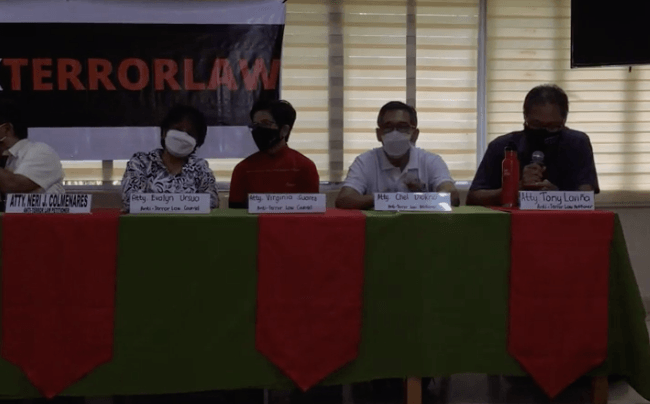SUMMARY
This is AI generated summarization, which may have errors. For context, always refer to the full article.


For two lawyers representing the journalists, artists, and women’s groups of petitioners, the ruling of the Supreme Court on the anti-terror law is a “consolation that we do not deserve.”
The Supreme Court upheld most of the feared law, voiding only two things, the more significant is the so-called “killer” qualifier that would have exempted dissent from the definition of terror only if it has no intent to cause harm. The intent qualifier removed, the phrase now says dissent is not terrorism.
Some lawyers and petitioners called it a win nonetheless.
Not for Evalyn Ursua, lawyer for the National Union of Journalists of the Philippines (NUJP) and Concerned Artists of the Philippines (CAP); and Virginia Suarez, lawyer for women’s groups.
“We do not deserve this mere consolation from the Supreme Court. We deserve more than that. We deserve protection. From so many arguments, it’s like we were all mistaken, for us to be given just those two [parts],” said Suarez in a mix of English and Filipino during a joint conference by several of the lawyers on Friday, December 10, the International Human Rights Day.
All of the definitions of terror were retained, including what petitioners said were vague parts, for example, “engaging in acts intended to cause interference to critical infrastructure.”
“The exemption on dissent? That is not true, dahil nakita natin kung paano i-implement ng anti-terror council ang batas na ito (because we’ve seen how the anti-terror council implements this law) and it will continue to implement it that way,” said Suarez.

‘We lost and we can’t relax’
The only other part voided was the second mode of designation under Section 25, which is designation based on another country’s request. It retained the unilateral power of the anti-terror council to designate based on its own determination without having to go to court.
“Walang kuwenta ‘yun dahil absolute power pa rin ‘yung Anti-Terror Council na umaastang korte at, in fact, mas mataas pa sa korte,” said Ursua.
(That doesn’t mean anything because the anti-terror council still has absolute power, like a court and in fact higher than a court.)
The only effect under the strict text of the law of the unilateral designation power of the council is freezing of assets, but the overlapping powers has heightened fears that it could still lead to arrest of those designated, and even close associates of those designated.
Ursua said she will not be able to accept that the ruling is a partial win, adding that framing it as a victory in any form might send the message that Filipinos can relax a bit.
“Ayaw kong maniwala ang taong bayan na nanalo kami. Talo kami. (I don’t want people to think we won. We lost) I don’t think we can relax, it’s dangerous to say relax because the qualifier was declared as unconstitutional. We will do a disservice to people by saying we can relax,” said Ursua.
Lawyers have expressed intent to file a motion for reconsideration to continue to appeal that the law be struck down in its entirety.
Glaring at this point is the preservation of the unilateral power of the anti-terror council to designate someone as a terrorist without having to go to court, and the council’s power to detain a suspect without a warrant for as long as 24 days.
There is some opinion that the decision of the Court, which is yet to be released, may set some guidelines and boundaries to safeguard it from abuse.
But the fact that they were not declared unconstitutional is still “scary and depressing,” said Ursua, adding that it was strange from the Court to release the summary of results, without the full copy.
“We are not completely safe,” said Tony La Viña, lawyer for red-tagged indigenous peoples, adding “we promise to continue to unify and continue our call to uphold our basic rights.” – Rappler.com
Add a comment
How does this make you feel?







There are no comments yet. Add your comment to start the conversation.